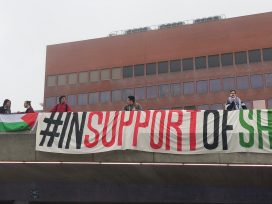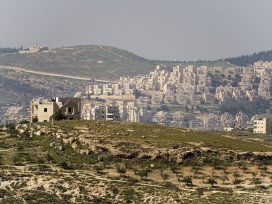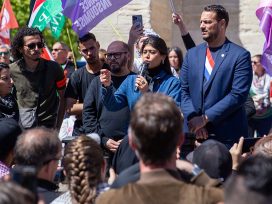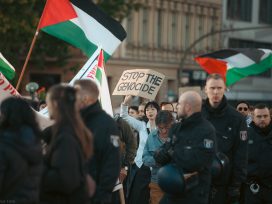 I shut my eyes in horror, already having seen what was coming. The pregnant refugee, whom activists not long before had given a reassuring mobile CT scan, was about to be turned into a projectile: three guards were looming to forcibly launch the tormented woman from a truck over the razor wire fence between Poland and Belarus.
I shut my eyes in horror, already having seen what was coming. The pregnant refugee, whom activists not long before had given a reassuring mobile CT scan, was about to be turned into a projectile: three guards were looming to forcibly launch the tormented woman from a truck over the razor wire fence between Poland and Belarus.
Watching the torturous scene in Green Border from a plush Viennese cinema, I was confronted by this inhumane act at a comfortable distance – physically remote and safeguarded by representation. But I still felt the loss of life that is all too real at EU borders; Agnieszka Holland’s film is based on events unfolding since Lukashenka, as of late 2021, began admitting refugees mostly from the Middle East and North Africa into Belarus only to force their passage onwards to Poland as a punishment for EU imposed sanctions. Rounded up on both sides of the border and ruthlessly passed back and forth between the deadlocked countries, refugees are trapped in a forested no man’s land, forced into abject survival.
In an earlier scene from the film, a supercilious head of operations, briefing Polish border guards, describes refugees as foreign weapons, not people. Physical aggression wrought on refugees is the palpable manifestation of the structural violence of border regimes. The film encourages both empathy with displaced peoples and outrage at their dehumanization – so vital in matters of persecution haunted by political gameplay.
Debate in Europe about the fate of refugees is an alarmingly weaponized topic. From the UK government’s human-rights violating, yet rapidly advancing bill on deportation to Rwanda for asylum seekers, to the EU’s plans for offshore migrant processing facilities, European policymaking has gone on the defensive.
Civility in question
Hans Kundnani, in an interview with the Green European Journal, calls this ‘Europe’s civilizational turn’: ‘between the end of the Cold War and 2010, the EU had been in expansive, offensive mode … optimistic and outward-looking, and imagined a world that could almost be remade in its own image’. He compares this to its current position of perceiving ‘threats against a European civilization that must be protected’. When discussing the Mediterranean, which Kundnani describes as ‘a sea border with North Africa’ likened to the US ‘land border with Mexico’, he refers to the witnessed outcome of cruel directives:
Human Rights Watch says that EU migration policy can be summarized in three words, “Let them die”.
And this is the dismissive treatment, resulting in brutality, of those who have often already fled violence. In his article ‘Wars of de-civilization’, Hamit Bozarslan identifies a common denominator connecting a litany of twentieth-century aggression: impunity. He emphasizes times when the West had turned a blind eye, retracted or colluded with invading forces.
‘Following the horrors of the Ghouta chemical weapons attack, Putin … seemed to believe that the door had been left open to advance his plans for an imperial Russia’; ‘after occupying Afrin, Turkey went back on the offensive to occupy a new area of Syria, taking it from Kurdish forces with the complicity of the Trump administration’; ‘Aliyev … had the green light to attack Nagorno-Karabakh’, given ‘that the much-vaunted “West” was far removed and paralysed’; and ‘Iran remains convinced as ever that the Westphalian system is giving way to the rule of strength and extortion,’ writes Bozarslan.
He argues that wars of de-civilization are being waged ‘in the name of … sovereign ethnic/national and non-state entities’. ‘Civilization’, he writes, ‘imposes limitations’ and yet ‘in return it allows us to orient ourselves more securely in time and space.’
Violence disguised as protection
Focusing on Gaza, Bozarslan sets out the various acts of violence perpetrated by opposing sides that refute or break with public international law. On first reading, it might seem that the only loss of civility Bozarslan describes is a tit-for-tat degradation of societies at war. However, a second reading hints at the breach of civility that occurs from within, when staging raids, whether purportedly offensive or defensive: violence disguised as ‘protection’ is still violence.
Attacking civilians who have nowhere to flee is a double violation of human rights: although Israeli hostages are still being held in Gaza, Netanyahu’s escalation of broad military assault in Rafah is brutally targeting already confined and internally displaced Palestinians – refugees in their own land.
Agnieszka Holland knows exactly what she’s doing when she depicts the emotionally conflicted Polish border guard in her film, after he turns a blind eye rather than mindlessly upholding his deplorable patrol duty. He curls up in bed, naked, in the foetal position, embraced by his pregnant wife – the fallacious role of protector and the privilege of safety both laid bare.
This editorial has benefited from a recent, in-depth Eurozine team meeting on Gaza, plus feedback from colleagues Mars Zaslavsky and Salma Shaka.

 I shut my eyes in horror, already having seen what was coming. The pregnant refugee, whom activists not long before had given a reassuring mobile CT scan, was about to be turned into a projectile: three guards were looming to forcibly launch the tormented woman from a truck over the razor wire fence between
I shut my eyes in horror, already having seen what was coming. The pregnant refugee, whom activists not long before had given a reassuring mobile CT scan, was about to be turned into a projectile: three guards were looming to forcibly launch the tormented woman from a truck over the razor wire fence between 




